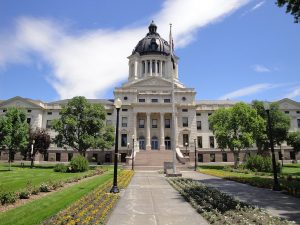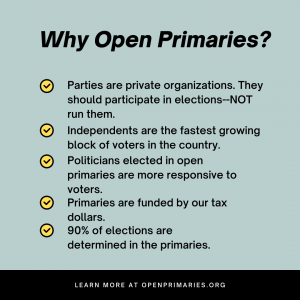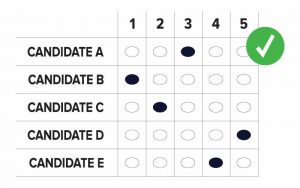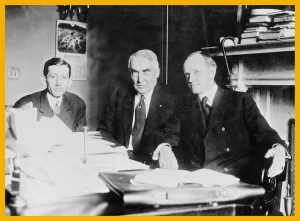The powers that be in sports do a good job of keeping their games up to date and entertaining. Professional baseball periodically tweaks the rules to improve the game. So do NFL team owners. And tennis and golf rules officials. The games are better for it.
Unfortunately, the same can’t be said about our election system. Election processes have been largely unchanged for decades. Over time, they have become out of date and unfair, but those in power don’t seem inclined to do anything about it. Meanwhile there are better alternatives readily available.
Sports Change to Stay Relevant
The governing bodies of sports have made countless major changes in the last few decades. The NFL has modified rules to protect quarterbacks, to deal with concussions, to encourage big plays and more. College football created a playoff system and is now adding more teams to it. The NBA added a shot clock and a three-point circle. Baseball added wild card teams. The number of teams in March Madness has grown. Tennis automated line calls. These changes kept each of these sports more relevant.

Basketball added the 3 point circle
Our Grandparent’s Election System No Longer Works Well
While the world has changed dramatically over the past 50 years, our nation’s election laws have remained largely the same. They are out of date.
Today’s election system isn’t written into our constitution. It wasn’t contemplated by the founding fathers. Instead, it evolved over decades in very different times and presumably worked okay up through the 1970s when the world started to experience multiple seismic shifts.
Since then, the internet, social media and 24/7 news have increased public focus on politics and politicians. Exaggeration and hysteria flood the airwaves. We now suffer unprecedented levels of partisanship and a worrisome lack of leadership both nationally and locally. Here in South Dakota, our grandparents’ election system isn’t working well anymore.
Our Election System is Unfair to Independent Voters
To start with, let’s acknowledge that our state’s election laws aren’t fair to independent voters. The number of independent voters, those unwilling to sign up with either of the top two parties, is growing. Nationally over 40% of voters self-identify as independent. Our party-controlled election system prohibits them from voting in the Republican primary, which is the only election that really matters in our state over 90% of the time. As a result, half of the electorate has absolute control of our politics and our state government.
That is not fair or democratic.

Our Election Laws Encourage Hyper Partisanship
And because our election system encourages and rewards partisanship, our elected officials often express views well to the right of South Dakota norms. Turns out that even with absolute power, Republican elected officials must be careful to act 100% Republican all the time lest they get taken out at the next party convention or primary.
Unfortunately, this systemic problem is not unique to South Dakota. Nationally, the hyper partisanship bred by party-run election systems prevents consensus solutions on big problems like the immigration mess, gun violence, abortion and homelessness.
It is time to take a fresh look at how we choose our representatives and leaders. There are alternative election systems available that are more inclusive. They can produce popular winners who better reflect the will of the voters. They promise to elect more independently minded people who won’t be dictated to by their party. Let’s start with the primary election system.
Open Primaries Let All Voters Vote
In a top-two, open primary system, all candidates for an office compete against each other in a wide-open primary election. The two candidates who get the most votes advance to the general election. With open primaries all voters get to vote. Everyone gets an equal chance to participate. It is a more democratic electoral system.
Candidates in an open primary quickly learn that to do well they must appeal to a broad range of voters. They can no longer thrive by focusing on the most partisan voters in their party. In fact, politicians with broad public appeal will no longer need to worry what the extremists in their party think of them. They will have the freedom to follow their own moral compass and do the right thing from time to time. Wouldn’t that be shocking!

Another type of election reform I like entails giving voters the chance to express their preferences more fully.
Ranked Choice Voting and Approval Voting Give Voters More Input
Ranked choice voting and approval voting give voters the opportunity to respond to each candidate when there are several running. Voters can rank the candidates or indicate which candidates they approve of, depending on which system is used. Either approach more accurately reflects voter intent than plurality voting which forces them to pick one, and only one favorite in sometimes crowded fields of candidates.

Both systems eliminate the spoiler effect, avoid the need for expensive runoff elections and promise to produce winners who reflect the will of the people.
Election reforms like open primaries and ranked choice voting don’t necessarily change who runs or who gets elected. But they improve candidate messaging and motivation.
Who Resists Election Reform?
Just like the rules in sports, election systems would benefit from periodic updating. But not everyone is open to it.

Most of those who oppose election reform proposals fall into one or more of three categories. The first, and perhaps the most obvious, is people who have used the current system to acquire positions of power. The second is hyper partisans from both political parties who put party ahead of state and of voters. The third, and it is not an insignificant group, is unimaginative traditionalists. I am regularly disappointed how many people I encounter who complain about the deterioration in our politics, but resist the idea of changing the way the political game is played. I hope we can somehow work around those folks and eventually bring about necessary change.
The Promise of Election Reform
Sports stay current by regularly reviewing and improving their rules. Our election systems deserve the same attention.
The promise of election reforms like open primaries and ranked choice voting is results more in sync with the wishes of voters. All voters get to vote. Candidates are motivated to appeal to a broad group of voters. Those with broad appeal no longer need to compromise their principles to please partisans. Issues will matter more, and party will matter less. Government has a chance to function properly.
As always Joe, very well done
An appropriate analogy–updates in sports. So many good thoughts…
Fantastic article Joe and right on the money! It’s obvious we need reforms but the lure of dark money, corruption and greed are large obstacles on the road to revision! I applaud your efforts and am willing to help wherever I can! Thanks!!
Joe,
Although I’m not into sports and consequently avoid employing sports metaphors, I find no faults in your thinking. As I’ve noted (perhaps to excess) in previous posts on this blog, I think Veblen spoke to this problem nearly a century ago in a manner which transcends the political.
You note that “While the world has changed dramatically over the past 50 years, our nation’s election laws have remained largely the same. They are out of date.” Veblen saw that as society evolved there was potential for a clash between “technology” (which dictates our
possibilities for social provisioning; producing, distributing and exchanging the stuff of existence) and “institutions” (the social structures which dictate how we actually pull this off.) In short, technology is about what we can do whereas institutions are about what we allow (or not allow) to be done. Institutions may be instrumental (functional) in that they further the general human condition. But institutions may also be ceremonial (dysfunctional) whereby society is not well served. Veblen termed such institutions “imbecilic” and attributed their continuing existence to the power of vested interests. (This provides a milieu for myth-making and reactionary revelry on a grand scale) But ultimately (optimistically?) the gulf between technology and institutions becomes untenable and institutions evolve so as to become more compatible with technology.
Perhaps we have reached such a point in South Dakota where your efforts will resonate with enough folks to bring forth changes beneficial to most of us.
The most unfair, outdated element of presidential elections is the electoral college, which gives disproportionate heavy voting power to small-population states. South Dakota is probably fine with that. However, from a national perspective, abolishing the electoral college to embrace the one-person, one-vote concept would be more fair.
The Electoral College is close to the only thing keeping the smaller states safe from being dominated by the ultra liberal coastal cities.
What Sweetman said.
You might want to count your blessings. Oregon state elections are dominated by the Democratic party and I’m sure you would rather live in downtown Sioux Falls than Portland. Its a mess! That being said I would agree that something other than a party dominating system may be a better option. Any examples where the systems you describe are in action and working?
In order to understand the American Election System, one would have to review, and understand the history of why we created the system as is, and the processes in place . The Electoral College work much better without the 12th Amendment, 13 Amendment, 14 Amendment, and 17 Amendment, let alone restore back to the people the “Direct Apportionment” of the Electors, and not b.s “Winner Take All” of all your States Electors. If your state has 10 districts, who ever wins those districts, gets the at 1 vote each. Therefore, republican win the more rural areas, while democrats most likely only win the urban areas. And there are way more RURAL districts than urban districts. So, Democrats would direct apportionment, which is why the Democrat Party destroyed it back in the 1830’s. Another thing we must get rid of is the 1878 Electoral College Commission, no way should congress interfere by appointing 10 non-elected commissioners to be the judge and jury of any disputes and controversies between State Electors. The Legislatures should be the Judge, and Jury of their own State Elections, period. No, a Rank Choice System is prone to corruption, and the other choice is not popular among the rural districts.